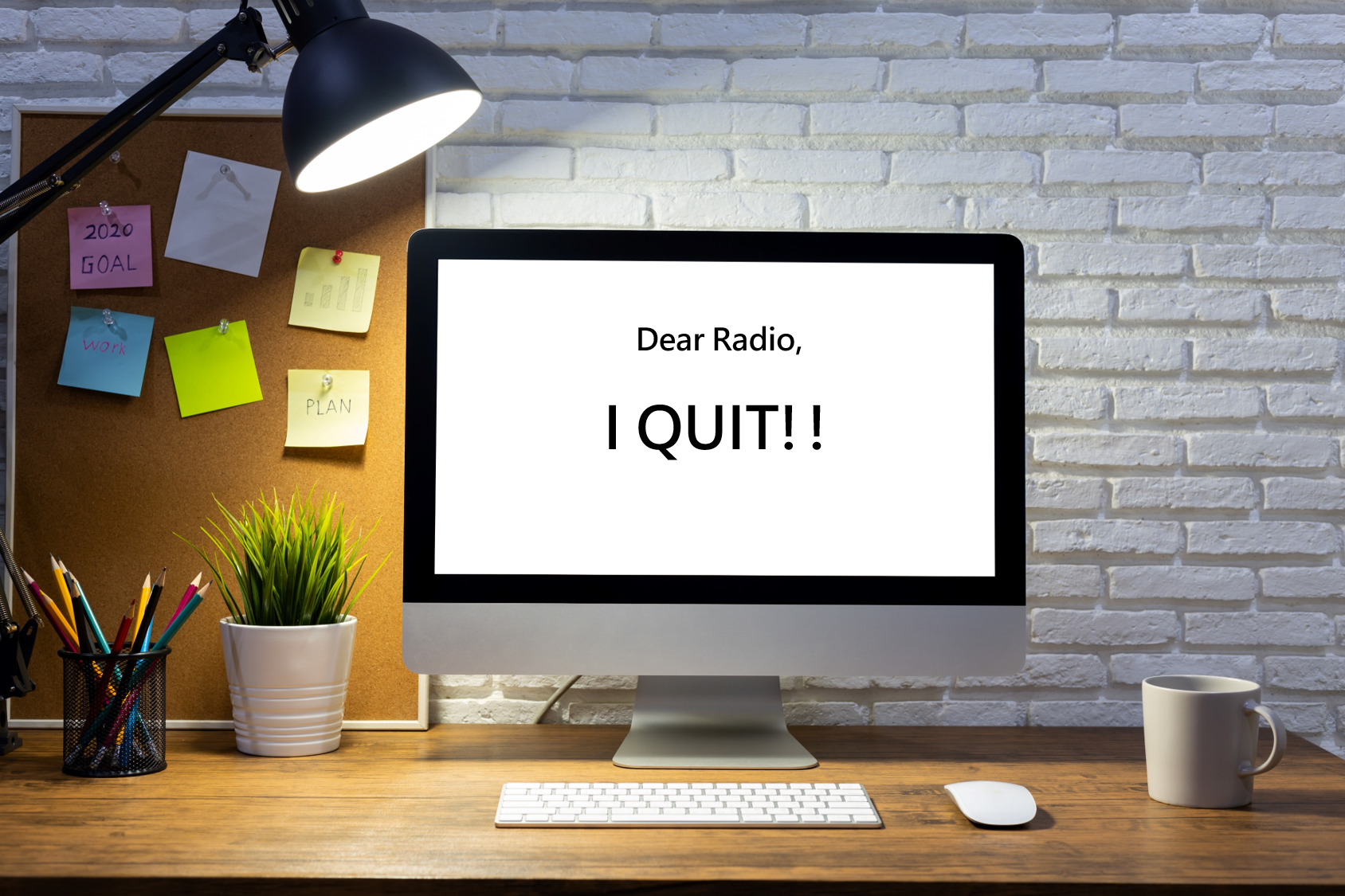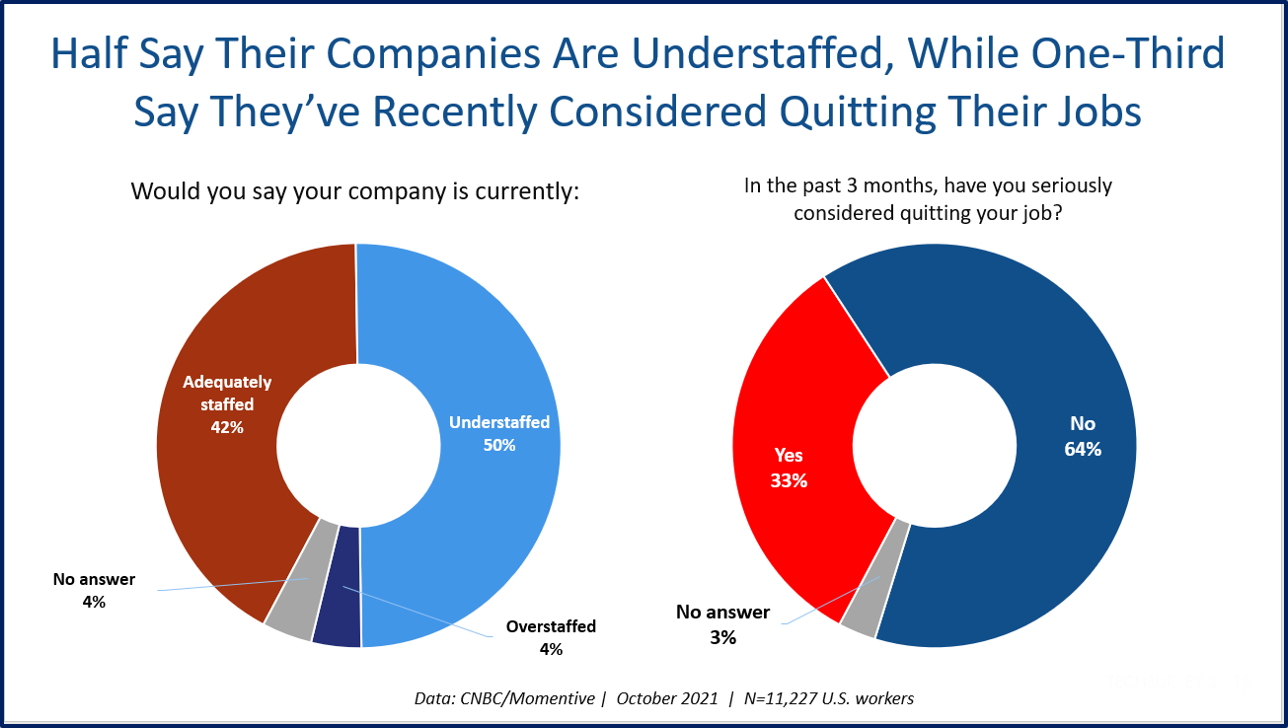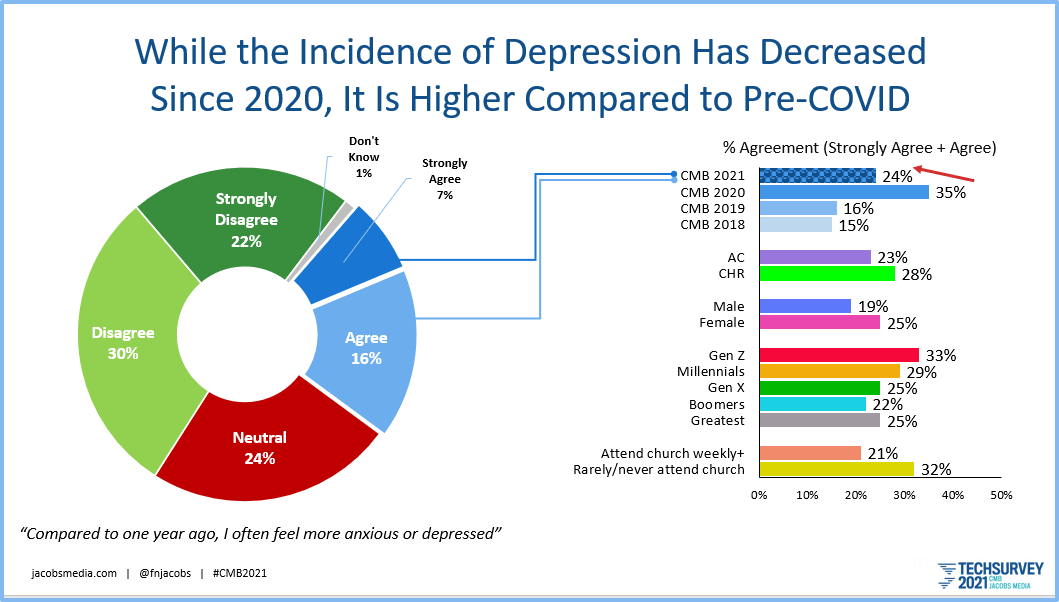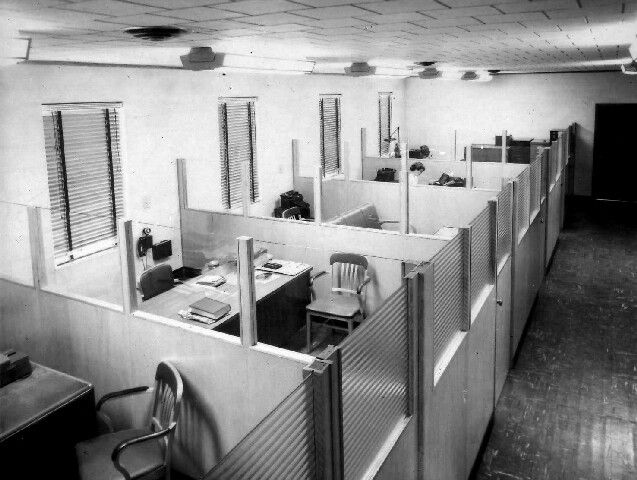
There’s no census in the radio business, so the “population” of the industry is something that we can only sense. Of course, every radio company has an accurate count. They know how many people they employ today versus one year, five years, or a decade ago.
How much smaller is the broadcast radio industry today as we rush headlong into 2022, either by company design or by the increased momentum of workers resigning – or a combination of both?
We don’t specifically know. But in our survey of air talent conducted in collaboration with Morning Show Boot Camp, we experienced a decided drop-off, compared to the pre-pandemic years. Usually a research survey that attracts 1,000 respondents drew just over 600 willing participants this past summer – another indicator the ranks are thinning.
In reading the trades and scrolling social media, it feels like more and more radio people are either resigning, hoping we think they resigned, or simply starting over in other fields.
Workforce analysts are learning about the effects of COVID on working psyches in the U.S. And the apparent lack of interest in holding down a job is spreading throughout job categories. The conventional wisdom is that baristas, wait staff, and other service workers are most apt to throw in the towel, especially given tough duties and low pay scales.
But increasingly, even members of the executive strata are questioning their jobs, their career impact on the quality of their lives, and its effect on their families. Where they work, who they work for, what they’re paid, and what they do are being self-scrutinized unlike ever before.
The New York Times’ Emma Goldberg poses the key question:
“In a ‘Workers Economy,’ Who Really Holds the Cards?”
And she answers her own query with stats like these:
- Job openings on ZipRecruiter that provide retirement plans are up 30% since COVID
- Signing bonuses leaped from 2 to 12% during the same period
- One of every 14 hospitality workers has called it quits
Julia Pollak is the chief economist at ZipRecruiter, and she points out that most of us don’t fathom just how different conditions in the workforce have become since the pandemic permeated our lives:
points out that most of us don’t fathom just how different conditions in the workforce have become since the pandemic permeated our lives:
“People don’t realize the scale of what has changed. If you take even one chair away in musical chairs, it changes the entire dynamic of the game. That’s what we’re seeing now, where the 50 percent increase in job openings has given job seekers dramatically more leverage.”
Crain’s Detroit, the business publication of record here in the Motor City, published a story last week, “‘The Great Resignation’ hits the executive ranks, too.” They profiled Detroiters in the corporate world who have made purposeful career changes due to some of the aforementioned “pain points.” Overall, 4.3 million Americans quit their jobs in August, an ongoing trend that impacts more than just restaurants, bars, and movie theaters.
CNBC conducts an ongoing poll about the state of the American workforce. In a story last Friday, “A vicious job market feedback loop is making the Great Resignation worse” – for employers,” journalist Eric Rosenbaum says a contributing factor is that half of U.S. workers believe their companies are “understaffed.”
This puts pressure on the existing workforce, many of whom were disenchanted in the first place. Not only are companies struggling to attract and hire new employees, they now run the risk of losing current staffers who continue to face pandemic-related pressure, on-the-job burnout, and stress.
That same CNBC study conducted among more than 11,200 workers, fielded just a couple weeks ago, reveals a full one-third (33%) of currently employed workers are thinking about calling it quits. It’s a nasty cycle.

Just how much of these shifting attitudes about the workplace and careers are fueled by difficulties in dealing with the pandemic?
In our most recent Christian music radio Techsurvey conducted this past summer for the Christian Music Broadcasters, the percentage of respondents reporting depression and anxiety is alarming. These feelings of stress, no doubt amplified by the lingering effects of the pandemic at home and at work, are permeating every level of our culture from education to entertainment to sports.
While an improvement over the apparent bottom in 2020, this year’s angst levels are above what we’ve seen in a “normal” year, that is, pre-COVID:

Every week, COVID deepens more societal stress cracks, the issues and dilemmas that stress us out and divide us. Last week, it was Aaron Rodgers. Before him, Dan Bongino and Kyrie Irving. This week, it will no doubt be something else that tests our collective patience, particularly around at-work protocols and the ways in which we interact (or don’t) with one another.
While these events are symptomatic of many aspects of our cultures, the workforce policies and debates they trigger continue to pit employees versus their bosses, whether they’re in law enforcement, commercial aviation, or broadcasting.
Last summer’s AQ3 study of American air talent revealed sinking levels of recommendation scores for their stations of employ and the companies that own them. If you’re not fond of who you work for, it becomes increasingly more difficult to keep up with the pack, much less working crazy hours to get it all done in support of the station or its corporate parents.
For radio broadcasters, the national conditions pummeling the employer-employee relationship are all in play. Many radio pros in sales, programming, on the air, and in positions like traffic, business, and HR feel overwhelmed by the work load and the related pressures it spawns.
and in positions like traffic, business, and HR feel overwhelmed by the work load and the related pressures it spawns.
On top of that, efforts to hire reinforcements are either not sanctioned by companies trying to finish 2021 strong (that is, spending as little unnecessary funds at this time of year as possible) or stations are experiencing the same difficulties hiring quality, motivated people as everyone else.
Some radio executives point to the numbers that reveal that while traditional radio jobs may be on the decline, new positions in digital – video, social media, data, software development – are actually on the upswing. While that may, in fact, be true, it brings no solace or additional compensation to those keeping radio stations afloat with both content and advertising support during the most challenging of times.
In radio, there’s one additional variable in play, especially among old school managers and executives who recall an industry where the supply of employees always outweighed the demand – that bygone era where many bright, young people greatly desired a career in radio. Today, most stations choose new hires from the “usual suspects” – radio veterans – rather than be in a position to bring in the best and the brightest from other fields or the college graduate ranks.
Today, radio stations, clusters, and companies will need to step it up in order to keep pace. That means higher initial salaries, more frequent raises, and more flexibility to work from home. They may also need to consider prospective employees who live hundreds or even thousands of miles outside the signal contours.
 And that’s just for new hires. What about those who have kept their stations on the air and the stopsets full these past many months? Retaining them will be challenging as these larger workforce pressures mount.
And that’s just for new hires. What about those who have kept their stations on the air and the stopsets full these past many months? Retaining them will be challenging as these larger workforce pressures mount.
I recently spoke with a female air personality who was recounting the early weeks and months of the pandemic – the days when virtually no one came into the building. She was one of a handful of “radio special ops” people who found herself working in a strange, even scary environment.
Being on the air in an empty radio station, surrounded by the creeping sense of fear and the unknown, all the while comforting listeners, smiling, and sounding upbeat during a time no one knew how this would end is something most of us haven’t experienced.
That was 20 months ago. We’ve learned a lot about radio, the audience, and ourselves during this difficult time that has tested us all. In much the same way war veterans suffer “invisible wounds,” many of radio’s strongest, hardest-working, and resilient pros have felt the mental anguish. None of us is getting past this pandemic without at least a few mental scars to show for it. The PTSD of COVID is incalculable, but we see it all around us.
But then there’s December – the final throes of a recovery year for radio, but a month that has become especially stressful in recent years. Holiday music may be playing out of the speakers, but pink slips have become all too common during the final 30-45 days of the year.
Will the end of 2021 actually include more downsizing for radio?
It seems counter-intuitive that at a time when “Now Hiring” signs proliferate – on storefronts, hiring websites, and on platforms like LinkedIn – broadcasters would be bucking the trend, cutting back, and thinning an already tired and shrinking herd.
But it’s radio. Nothing is impossible.
You can access the CNBC/Momentive Workforce Survey here.
- Media And Technology In 2025: Believe It Or Not! - April 18, 2025
- In Radio, You Just Never Know - April 17, 2025
- The Secret To Making A Great Podcast (And Great Radio) - April 16, 2025




“But it’s radio. Nothing is impossible.” Thank you, Fred. All great content & presentation has the opportunity to win without a big spend.
Appreciate it, Clark.
Fred,
My 2 cents.
Covid may have been the “last straw” for lots of people.
In radio, some have been asked to double, and triple our responsibilities…while taking pay cuts and/or NOT receiving a raise for YEARS.
Others are reaching “the age” where they’re considering packing it in…and with all the covid pressures & BS, the decision got support.
I see it all the time in our daily trades. Lots of retirements and “look who’s available” posts..
And many others (like myself) who have branched-out into streaming and voice over work.
Radio’s last 15 years have NOT been good for on-air talent…and Covid has been just one more reason to abandon ship, for many folks.
JC, like so many things, COVID accelerated a trend that was already there. It probably exists on both sides – employees reaching that point where they were thinking of calling it quits, and management wondering how much longer they planned on working. All that said, your last observation has stuck with me. Thanks for chiming in.
So much to unpack here, Fred. I’ll just note the banal fact that the churn we see everywhere lately reflects an overall, at least temporary, rebalancing of the labor-management power gap. Employees (labor) are reassessing their desires and their options as never before, and they seem to have the whip hand. But radio as an industry (management) has an advantage many others don’t: the romance of the medium, which the jaded might jeer at but which nonetheless exists. Why else have so many in radio, television, and film always worked “day jobs” in other sectors just to keep their hand in for the work that really touches their souls? (This has added poignancy for me because, during most of my “radio career,” my day job was in corporate labor relations.)
Thus, despite the short-term turmoil and anxiety, perhaps radio will in the longer term benefit from this partial insulation from the harsher gusts of the current “resignation economy.” Those who genuinely love radio may be able to hang on while the shakeout reduces the ranks of those who don’t, leaving the industry stronger (can you say Nietzsche?). Wash, rinse, repeat.
This sobering, shocking, even depressing read today left my head spinning. I didn’t know how to express all I was trying to get my brain around. But you did, John. Thank you.
You may have a point, John. There is still a sort of romance to radio, in spite of everything. And that advantage might work for companies for a while – or as you point out, at least to weather the storm. I would add this, however. A barista at Starbucks (for the most part) is interchangeable – they come and they go.
At a radio station, a trusted, beloved personality can create an unquantifiable attachment with thousands of fans. Finding a way to keep those folks in the fold, and yes, take better care of them is something more companies should aspire to.
As always, John, great comments and observations. Thank you.
Another great read, Fred. The great resignation we’re seeing now all comes down to money and management. One thing across the board, not just radio, is the people (maybe this is just in radio) who were and have been working every single day, have not been given much more than an atta boy. Some jocks did their shifts from home, with Covid, and not even a thanks. So, a lot of this that’s happening is because management has to learn a new way to manage.
As it pertains to radio, again, I’m the one that says sales has been well cared for in the pandemic, and every other time. It’s really time for corporate and upper management to quit treating jocks like a “necessary evil”. BEFORE Covid, radio, as of late, has had a hard time getting people to move to fill a job. They can’t seem to get that a cross country move, for $12/hour and t-shirts and concert tickets, doesn’t look that good anymore. Another “reckoning” that I believe is coming from the rumbles of the jocks is this, we WANT our up and comers to make $15-$20 an hour and not have to rely on several other jobs or government assistance to be in radio. HOWEVER, the 30+ years that it’s take some of us to get in that $20+ range will have to be addressed. My feeling is in the next year. If not, I think you’ll see radio have a crisis like they’ve never seen.
It’s time for real change to happen. The sales staff won’t leave. It’s what they’re selling that will.
Tammie, I don’t hear from you that often. But when you take the time to comment, it is always from the heart – and it’s well worth the time to read.
Two things here:
Treating talent like a “necessary evil” isn’t (IMO) an across-the-board corporate perception, but it is out there. If I hear it, others do, too.
And then there’s your last statement. Salespeople are (usually) only as good as the content, or better put, the ratings.
I hope a lot of people read your comment. Thanks for taking the time.
A shocking, sobering read today, to be sure, perhaps especially Tammie Toren’s comments.
I noticed–to my surprise–that those who “attend church weekly” versus those who “rarely/never attend” were also included in the “Incidence of Depression” chart. Interesting that the feelings of anxiousness and depression ran about 50 percent higher in those who don’t attend worship services regularly than those who do. Might be a good reminder to all that, while we have to work away in the real trenches on the real problems of real life, it really is good for us (I would go so far as to say we’re “wired” by our Creator this way) to regularly gather with others who can help keep us–as we help keep them–focused on the Bigger Picture of Life.
In other words, looking up and remembering “nothing is impossible.”
You’re a smart observer, Dave. We broke out “church attendance” for a reason on that chart, and you connected the dots. For many people, radio is their “church.” Thanks for chiming in on this one.
I didn’t mean to bum you out. I just always try to be super honest with Fred as he has the ears of the movers and shakers. I love my job and this business. Please don’t get me wrong.
No, Tammie, we’re on the same page. While your observations may be “shocking” and “sobering,” they’re from the front lines and, as you said, need to be heard by those “movers and shakers” who Fred has the ears of. You and I both love the business, but part of loving it is recognizing–and hopefully addressing–its problems in order that we, and those after us, and the listeners, can all continue to love this amazing wonder called radio. Like Fred, I’ve come to always expect honest, thought-provoking insights from you. Thanks.
Great article. No mention as usual of the shrinking pool of engineers who understand how any of this works.
Apologize for that, Clive. When it comes to hiring by position, engineering may be in the worst shape of all.
radio is also dying for radio has nothing of value to listen to. fm is now as bad as am was and is.
I think that stations that have thrived during the pandemic are the ones who had ‘cheerleader’ leadership. The ones that took the opportunity to downsize staff or cut hours merely added to the overall stress felt by the remaining staff.
We have all received poor service from an unhappy employee, but management often forgets that people tend to quit bad managers rather than bad jobs. In short, unhappiness comes from the top.
If the pandemic has taught us anything, it is that the front line workers, either the person handing you your coffee or air staff, need to be listened to, fairly compensated, and kept engaged.
Paul, you may appreciate today’s blog post, focused on Ford’s CEO, Jim Farley, and how he’s approaching challenging times at his company and within the auto industry. Thanks for commenting.